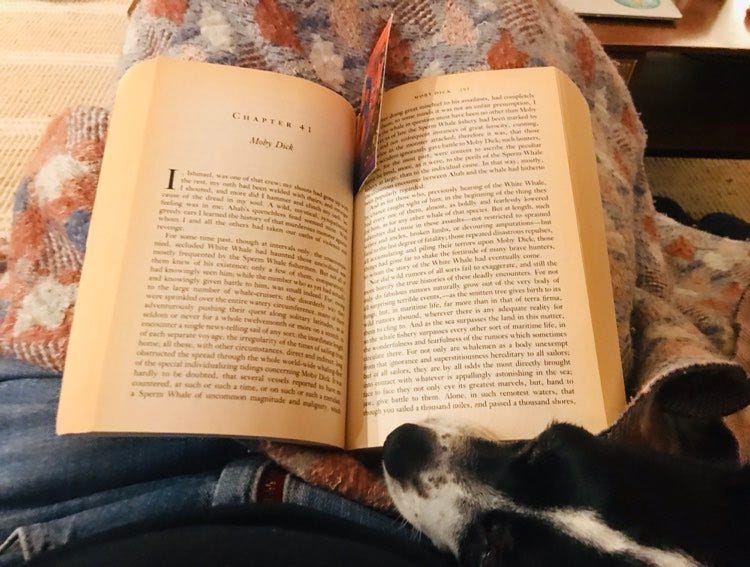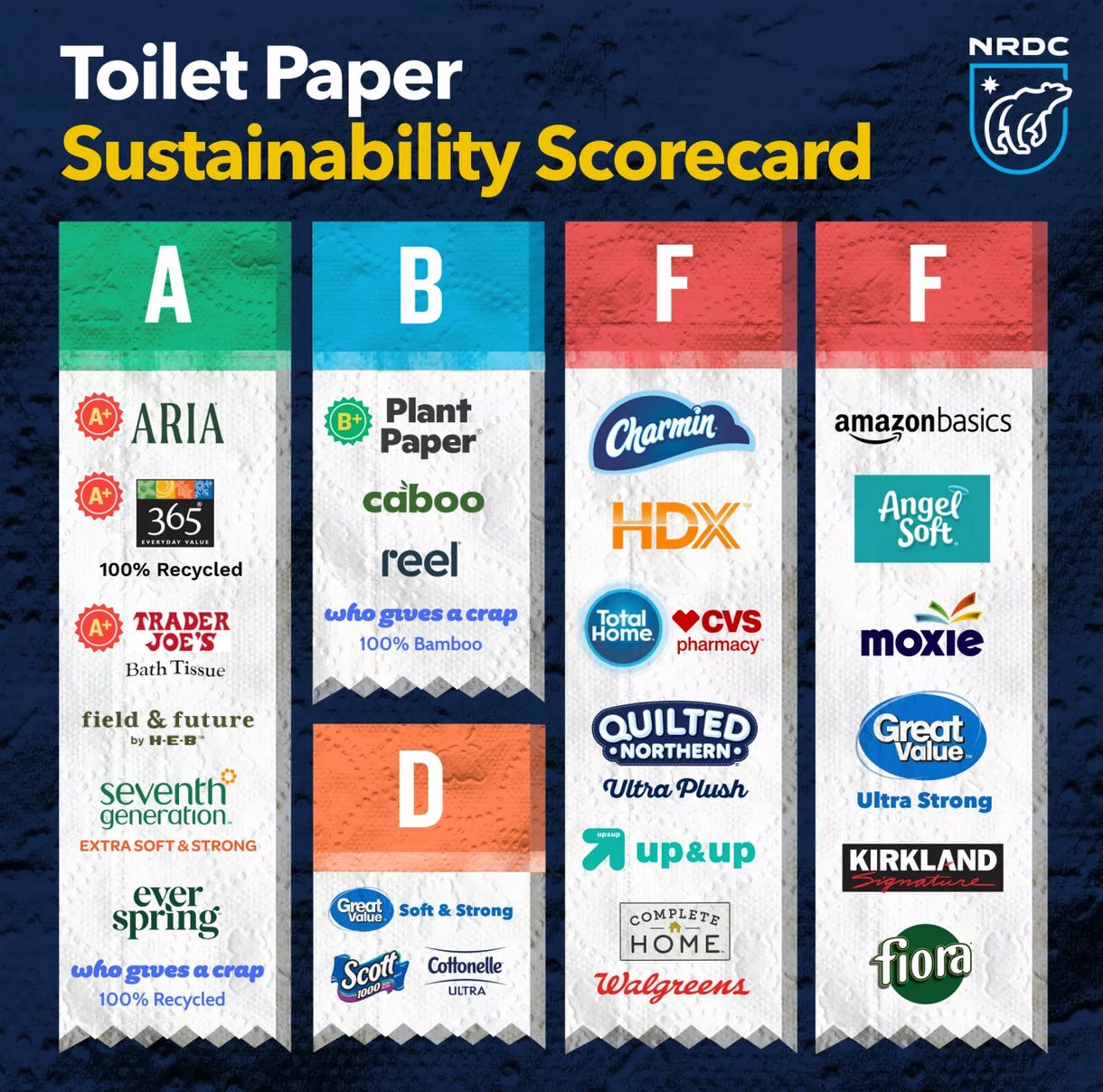Two summers ago in Newfoundland, we watched a trio of bachelor sperm whales dive and surface. Any whale is a good whale, but there was something particularly magical about this trio. They were the whales I had once considered a stand in for all whales. Theirs the shape I drew when I added a whale to my childhood drawings. They were Whales with a capital W.
They were also the whales that inspired Herman Melville to write Moby Dick, and now they were the whales that inspired me to want to read Moby Dick, a novel I had planned to get around to someday.
Back in New York, I picked up the novel and started to read. Melville’s sentences were long and laborious. So long and laborious that my mind was soon elsewhere: Should I eat an apple? Should I add (and then cross off) ‘read Moby Dick’ on my day’s to-do list? Should I brew some tea? Should I check and see how many people liked my whale photos on Instagram? I really wanted to read Moby Dick and yet, I couldn’t get into the book. I needed accountability. I needed someone to read Moby Dick with me.
Enter my husband Bryan. Though, he had read Moby Dick years before, he is a lovely person who agreed to read the novel aloud with me. And so over the next 18 months, we slowly read through Moby Dick. Sometimes Bryan read. Sometimes I did. Sometimes I mended while he read. (So Moby Dick of me!) Sometimes my mind wandered. Once I fell asleep. But mostly, we read a page or two and then talked briefly about what we’d read. Once, we looked up the various whales that Melville described. Occasionally, we discussed whaling. Often, we sent each other Moby Dick adjacent articles to read.
With Moby Dick, we built a habit. A slow-reading habit. Next, we slow read My Antonia, whipping through it in a matter of months because while we read slow, it’s a short novel. Last month, we abandoned a Russian novel. (Why power through if we weren’t feeling it?) Now, we’re slow reading a French novel that was once banned in Paris. (Any guesses?) In a world where everything moves quickly, where my to-do list seems to grow each day, where I never end the day thinking I have done everything, it is subversive in the best possible way to read something slowly. And to read it aloud.
I want to argue that we need to preserve things that are slow. I could have written this newsletter with AI and reclaimed my morning for gardening, but then AI would have had to make the awkward transition between Moby Dick and toilet paper and I would have missed out on that fun.
Because there is a connection: Once upon a time, humans nearly hunted whales to extinction. One of the reasons Moby Dick is such a classic is because in this specific literary case, the whale won. Whales, of course, did occasionally sink whaling ships, but on the whole, they were outmatched by our voracious appetites and our technology. If humanity hadn’t banned whale hunting (and found a new source of energy), our seas would now be empty of whales.
Which brings me to clearcutting old growth forests. When whales were being hunted, our forests were also being logged.
“Between 1850 and 1860, more than 60,000 square miles of North American forest was liquidiated,” wrote John Vaillant in his nonfiction classic, The Golden Spruce. He goes on to write, “They cut the forest the way they breathed the air—as if it were free and infinite.”
I sat on that sentence for a long time: They cut the forest the way they breathed the air—as if it were free and infinite.
Whale hunting is mostly history, with only a handful of countries still killing whales, but we are still clearcutting the forests as if trees were free and infinite. They are not. How many 250 year old trees must you cut down before there are none left? In The Golden Spruce, Bill Weber, a logger, says: “It could be argued that we’ve squandered the resource. We don’t have eight hundred years to replace an old-growth forest. In a few years we’ll just have guts and feathers left.”
Hold that thought and consider another: We are *still* clearcutting old growth forests and we’re cutting them to make toilet paper. Charmin is cutting down the boreal forests of Canada to be used once and then flushed down the toilet. What madness is it to cut down trees that were already mature trees when Herman Melville wrote Moby Dick? They have existed all these years, and we then cut them down for toilet paper. Captain Ahab has nothing on us when it comes to sheer folly.
Personal Action: Make sure your toilet paper brand is sustainable. Each year, NRDC creates a toilet paper sustainability scorecard. Charmin always gets an F. I like Trader Joe’s brand and I like that it scores an A+. It’s affordable. It’s comfy. It’s not made from old growth forests.
.
Why it Matters: Charmin is the most popular toilet paper brand in the United States. And as long as consumers keep buying old-growth toilet paper, Charmin will keep selling it. Don’t listen to their greenwashing. Planting a monocrop of baby trees does not replace the 200+ year old trees they’re cutting down or the rich ecosystems they’re destroying. We don’t have to flush old-growth forests. We can vote for sustainability with our purchases.
Change the systems: Tell Charmin directly that you don’t want them to clearcut old growth forests. I like this petition by NRDC. They’re the environmental group that created the toilet paper scorecard and Charmin is very aware of their advocacy on this topic. What Charmin needs to know is that NRDC’s advocacy is reaching actual customers.
Why it Matters: Old growth forests are important ecosystems. They’re the legacy that we’re leaving our children. Humans have been cutting trees down for so long that there are very few truly old growth forests left. We need to stop the madness now.
Link Roundup
A novel I recently read and really liked: Such a Fun Age by Kiley Reid. I listened to the audiobook and was immediately pulled into the satire and the fast-paced dialogue.
Father’s Day read. My essay You Know How This Goes came out a couple years ago. It’s in the vein of Billy Collin’s The Lanyard, but since I’m a prose writer, I take a longer—more Melvillian—journey.
For residents of New York: Learn about ‘The Packaging Reduction and Recycling Infrastructure Act’ and call your rep to ask them to support this bill today. We’re running down the clock on a bill that would help turn off the plastic tap.
Questions: What’s the classic you’ve always wanted to read, but haven’t? What classic should we read next? Why do you think Charmin is still cutting down old growth trees?








War and peace. I will probably never read it but I feel like I should.
Watership Down is a wonderful read aloud. I read it to my preteen kids years ago. Les Mis. The Count of Monte Cristo. Crime and Punishment.
I have never read Moby Dick! I love your slow reading practice. I have been thinking a lot about doing things slower and in old school ways lately, I think largely because of (sigh) all the AI stuff.